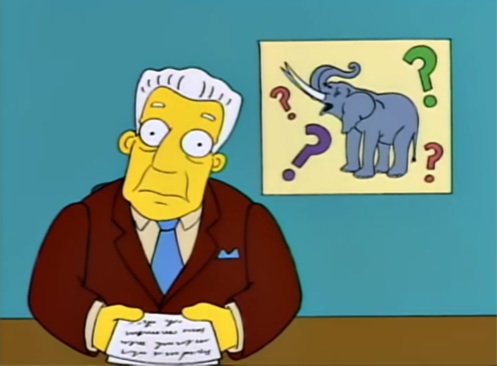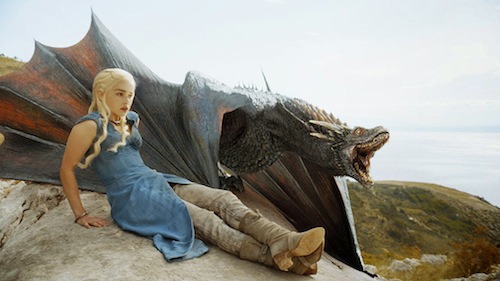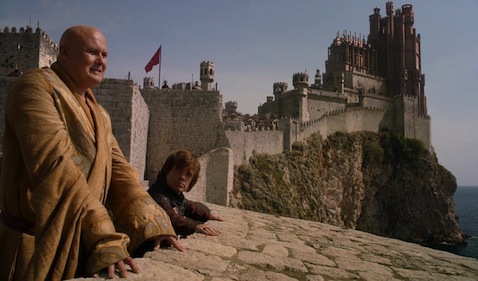If there is one thing Machiavelli’s The Prince needed, it was more dragons. Alas, it would have been so easy! All he had to do was mention Saint George.
Although the closest Machiavelli came to discussing these mythic beasts was a brief shout-out for Chiron the centaur, such omissions make HBO’s Game of Thrones and George R. R. Martin’s A Song of Ice and Fire all the more interesting in today’s classroom. After all, if Daenerys Targaryen were a Poli Sci major today, she’d have every reason to throw down her textbooks and demand: “Where are my dragons!”
Where are her dragons? That’s a good question. I say they belong in her classes alongside Hannibal’s elephants.

It may sound ridiculous to reference works of fantasy in order to better explain politics, but such a practice is as old as Plato’s dialogues on Atlantis. After all, what is a well-written fictional character other than a device for better understanding ourselves? One philosopher famously examined the moral conscience of Huckleberry Finn, and medical doctors have repeatedly diagnosed the illnesses afflicting Charles Dickens’s Tiny Tim. Even Machiavelli did not shy from discussing the Biblical Moses, the hero Achilles, or the mythical Theseus alongside Marcus Aurelius, Julius Caesar, and Pope Leo X in The Prince.
If we entertain this same method, Tywin Lannister’s recent conversation with his grandson over “What makes a good king?” in Game of Thrones becomes little different than if Machiavelli had posed to the young monarch the question “What makes a good prince?” Not only do the rules of political science apply to the world of Westeros in very much the same way as they do in our own, but George R. R. Martin’s characters provide excellent case studies for making otherwise abstract aspects of political theory far easier (and more entertaining) to grasp.
Case in point: the very question of what makes a good king, especially when posed by a character like Tywin Lannister. Was Lord Tywin right? Do the qualities of holiness, justice, and strength ultimately pale in comparison to wisdom? History has plenty of examples to strengthen as well as weaken this claim, including some figures that likely influenced the fictional kings Tywin names. However, the case could also be made that Lord Tywin is a poor person to answer this question not only because of the one-sidedness of the dialogue, but because of everything we as an audience have already learned about House Lannister thus far in HBO’s Game of Thrones.
Without delving into spoilers, Tywin tells the impressionable Tommen that “the wisest kings” listen to their counselors long into their reign. Cleverly, the unspoken lesson in this discussion is that Tommen should always listen to Tywin. It is a shame Machiavelli was not in the room to offer his opinions as well, for he provides an interesting counterpoint to Tywin’s argument when discussing secretaries in The Prince. After citing examples not nearly as well known among today’s audiences as even minor George R. R. Martin characters are, Machiavelli cautions that ministers who think more about themselves than their sovereign “will never be a good minister.” Will Tywin ultimately prove a poor minister—or better yet, has he always been one? His legacy remains to be seen, but he has already demonstrated repeated failings as a father, and it could be argued that those failings have significantly damaged his qualities as an advisor. His particularly toxic relationship with his youngest son, Tyrion, will undoubtedly come back to bite the Seven Kingdoms they both serve—perhaps even in the form of dragons.
See! Just like that, we got to discuss Machiavelli and dragons in the same paragraph.

Such personal failings appear to be instrumental to the characters in Game of Thrones, never mind the complexities of their political nature. Just about every character seeking the Iron Throne has somehow found their claim hindered by (frequently) self-inflicted wounds. House Lannister holds the throne, but their claim is illegitimately founded on incest. House Baratheon owns it by blood and the written words of Eddard Stark, but Stannis Baratheon’s religious fanaticism and his younger brother Renly’s private affairs severely undercut both their best efforts. Daenerys Targaryen claims the Iron Throne in exile, but her armies are an ocean away and her prized dragons have become increasingly unpredictable. House Tyrell plays the game of thrones better than anyone else in the Seven Kingdoms, yet they have never won the grand prize. House Stark plays the game fairly, and for that reason, Starks die. If Machiavelli had HBO, he would have had more than enough material to write books on these families and their many foibles.
Ultimately, enormous credit should be given to George R. R. Martin and HBO not simply for the rich world they’ve created, but for choosing to base their world’s politics very much on our own. Fortunately, these foundations extend far beyond the Wars of the Roses. When Tyrion quips “one game at a time” to Varys’s reports about dragons, he is echoing Abraham Lincoln’s reply to Secretary of State Stanton during the Trent crisis. Whenever the word “Dothraki” is spoken on the show, replace the word with “Mongol” for a better understanding of how huge a threat the Golden Horde was to Europe. Whenever Stannis Baratheon mentions the “Lord of Light,” just picture what would happen if a major U.S. presidential candidate pledged his full faith to Lucifer. And naturally, all this goes without bringing up the white walkers, who function a bit like a climate-change debate nobody in Westeros wants to discuss.
Such is politics as usual in George R. R. Martin’s Westeros, which ultimately makes Game of Thrones as much a political drama as House of Cards or The West Wing. The key difference is that Game of Thrones takes a more timeless approach to political theory, rather than firmly rooting itself in the contemporary United States. As a result, Game of Thrones just might enjoy even more applications in Poli Sci classrooms than Mr. Smith Goes to Washington should professors dare to explore the subject with their students. And should they do so, their students might actually look forward to Monday classes.
Such is the power of Machiavelli once you throw in a few dragons.
This post was originally on Tor.com on April 30, 2014.
Jacopo della Quercia is an educator and history writer with several years experience teaching Machiavelli at the college level. His debut novel, The Great Abraham Lincoln Pocket Watch Conspiracy, is being published by St. Martin’s Press and is available for pre-order; you can read an exclusive, online-only chapter for the book here.










